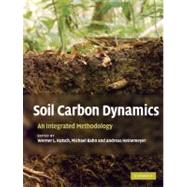
Note: Supplemental materials are not guaranteed with Rental or Used book purchases.
Purchase Benefits
What is included with this book?
| List of Contributors | p. vi |
| Preface | p. ix |
| Editorial Acknowledgements | p. xi |
| Soil carbon relations: an overview | p. 1 |
| Field measurements of soil respiration: principles and constraints, potentials and limitations of different methods | p. 16 |
| Experimental design: scaling up in time and space, and its statistical considerations | p. 34 |
| Determination of soil carbon stocks and changes | p. 49 |
| Litter decomposition: concepts, methods and future perspectives | p. 76 |
| Characterization of soil organic matter | p. 91 |
| Respiration from roots and the mycorrhizosphere | p. 127 |
| Separating autotrophic and heterotrophic components of soil respiration: lessons learned from trenching and related root-exclusion experiments | p. 157 |
| Measuring soil microbial parameters relevant for soil carbon fluxes | p. 169 |
| Trophic interactions and their implications for soil carbon fluxes | p. 187 |
| Semi-empirical modelling of the response of soil respiration to environmental factors in laboratory and field conditions | p. 207 |
| Modelling soil carbon dynamics | p. 221 |
| The role of soils in the Kyoto Protocol | p. 245 |
| Synthesis: emerging issues and challenges for an integrated understanding of soil carbon fluxes | p. 257 |
| Appendix: Towards a standardized protocol for the measurement of soil CO2 efflux | p. 272 |
| Index | p. 281 |
| Table of Contents provided by Ingram. All Rights Reserved. |
The New copy of this book will include any supplemental materials advertised. Please check the title of the book to determine if it should include any access cards, study guides, lab manuals, CDs, etc.
The Used, Rental and eBook copies of this book are not guaranteed to include any supplemental materials. Typically, only the book itself is included. This is true even if the title states it includes any access cards, study guides, lab manuals, CDs, etc.